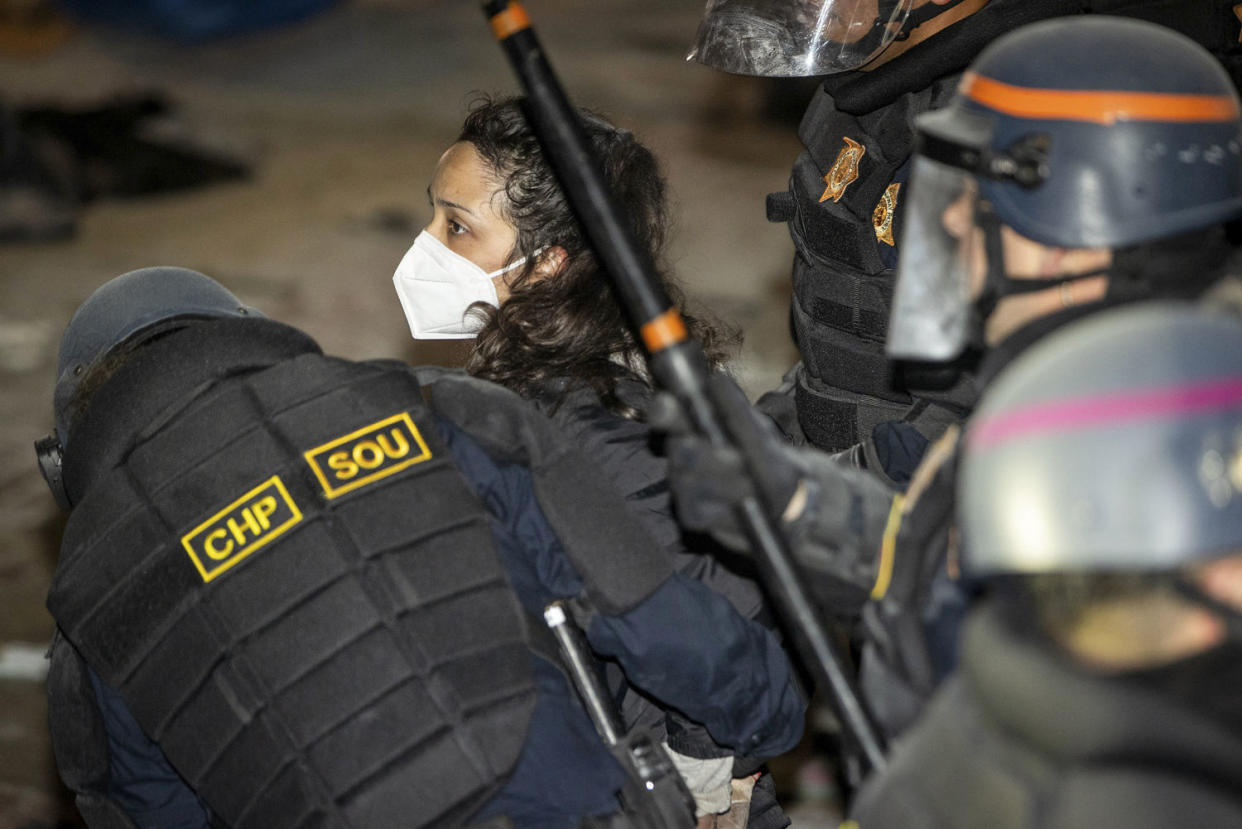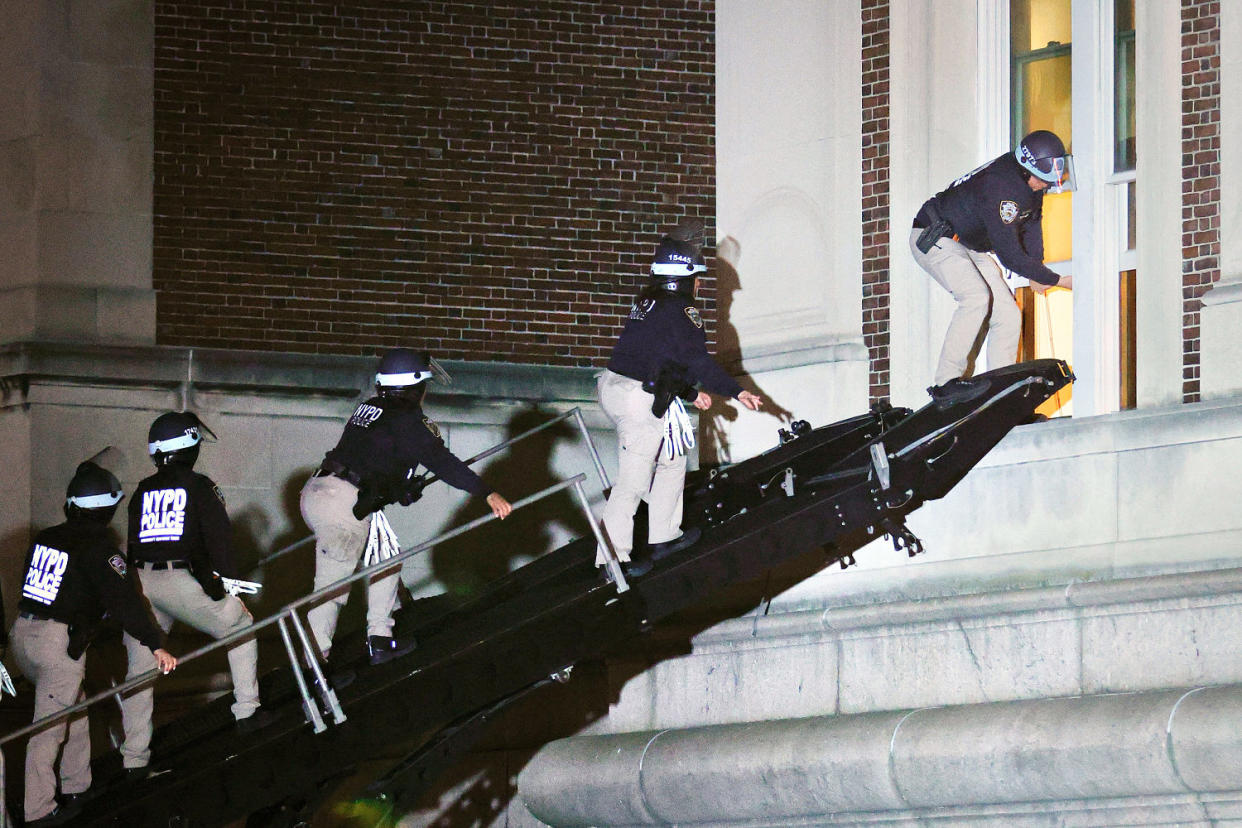Columbia cancels main commencement ceremony in latest campus upheaval
A protest against the Israel-Hamas war at Columbia University that began in mid-April has sparked a wave of demonstrations at campuses across the country, including one at UCLA that was broken up by hundreds of police officers.
On May 6, Columbia University in New York announced they were canceling their main commencement ceremony over security concerns related to the protests on campus, a university official told NBC News.
Demonstrations against Israel's war in Gaza have popped up at nearly 60 colleges and universities around the U.S., several of which have ended with police storming protest sites and arresting students.
The wave of campus activism has drawn parallels to the anti-Vietnam War protests that swept universities in the late 1960s.
Here's what to know about the rapidly spreading demonstrations.
Why are students protesting?
Student groups at dozens of universities have spoken out against Israel's military action in Gaza, while calling for a cease-fire in the Israel-Hamas war and demanding a halt of U.S. military aid to Israel.
Hamas killed about 1,200 people and took more than 200 hostages in an attack against Israel on Oct. 7, 2023, according to Israeli officials. Israel has responded by killing more than 34,000 Palestinians, health officials in Gaza say.
Student protesters are also calling on their universities to divest from any weapons manufacturers or companies with ties to Israel. That means they do not want the university investing any of its endowment funds from donations, which are billions of dollars in the case of some schools, in those companies.
What’s happening at UCLA?

Los Angeles police officers in riot gear forcefully entered a barricaded encampment set up by pro-Palestinian demonstrators on UCLA's campus in the early hours of May 2, arresting dozens of protesters, a senior official familiar with the operation to dismantle the encampment told NBC News.
Earlier that night, the pro-Palestinian encampment was attacked by pro-Israel counter-protesters, who threw fireworks and tear gas at them, UCLA student journalist Dylan Winward told NBC News. The counter-protesters did “not appear to be student led," according to Winward.
Police pulled down barricades and tents after a tense standoff. It’s not immediately clear how many of those arrested were students, faculty or people not affiliated with the university.
What happened at Columbia?
The initial protest at Columbia took place on April 17, when students set up an encampment in front of the Manhattan campus' Butler Library. The demonstration coincided with university President Nemat Shafik being called before Congress to be questioned about concerns over antisemitism at the school.
New York police were called to the campus on April 18 to disband the encampment, and they arrested more than 100 protesters. Other protesters remained in the encampment for more than a week, demanding the university divest from Israel.
On April 30, dozens of demonstrators took over Hamilton Hall on Columbia's campus, vowing not to leave until their demands were met. They hung a banner outside the building that said “Hind’s Hall" in reference to a 6-year-old girl, Hind Rajab, who was found dead in Gaza days after being trapped under Israeli fire.

Hours later, police stormed the building via a makeshift ramp into a second-floor window, clearing the historic hall where students also barricaded themselves in 1968 to protest the Vietnam War. The NYPD also swept out the encampment on the campus.
“We regret that protesters have chosen to escalate the situation through their actions,” the university said in a statement. “After the University learned overnight that Hamilton Hall had been occupied, vandalized, and blockaded, we were left with no choice.”
One of the people involved in the protest was identified as Lisa Fithian, 63, a veteran activist the NYPD labeled as a "professional agitator," NBC News reported.
At a press conference on April 30, New York City Mayor Eric Adams condemned "external actors who attempted to hijack this private protest." It remains unclear how many involved were students, professors, or people unaffiliated with the university.
On May 6, the school announced it was canceling its main, university-wide commencement ceremony on May 15 in favor of "smaller-scale, school-based celebrations."
A university official told NBC News that security concerns were a factor, and the decision was made after discussions with student leaders.
“Our students emphasized that these smaller-scale, school-based celebrations are most meaningful to them and their families,” the university said in a statement on May 6. “They are eager to cross the stage to applause and family pride and hear from their school’s invited guest speakers.
What other colleges have protests on campus?
Pro-Palestinian demonstrations have been held at nearly 60 colleges and universities across at least 28 states through May 2.
The protests have been held at large state schools like Arizona State and the University of Texas, multiple Ivy League universities, city schools like George Washington University in Washington, D.C., and smaller schools like Emerson College in Boston and Swarthmore College in Pennsylvania.
Hundreds of people have been arrested across numerous demonstrations.
This article was originally published on TODAY.com
